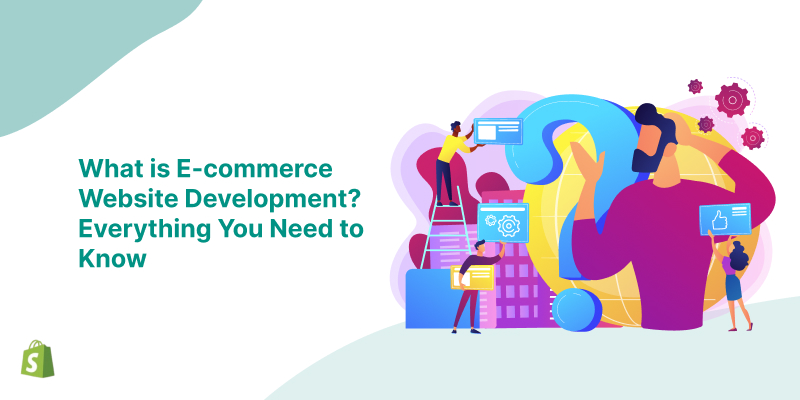Ecommerce website development is the process of building an online store that helps in the electronic selling of products and services. It focuses on creating a fully functional platform for digital transactions. This discipline covers a broad spectrum of activities: design of appealing, intuitive interface; integration of secure payment procedures; and site performance enhancement. In today’s cut-throat world of internet retailing, simplistic effective ecommerce website designs are non-negotiable.
Table Of Contents
The ecommerce industry is on the rise worldwide and different companies are turning their attention to online stores. According to statistics, at this time more than 2.14 billion shopping online per year, and this figure is growing. An effective ecommerce platform for business targets this large customer base. It will make life easier for the consumers as well as increase the profits earned by the companies.
Ecommerce website development services is not just about designing a website, it about how it should work, how secure it is, and how well it has to work for the user.
Ecommerce website development can be best described in its basic form as the building of an online store. This involves creating a platform in which the customer can go through various products and purchase a product. This entails the tend to construct web frameworks, content management system, payment gateway amongst other tools into a coherent website.
Want to explore the possibilities of ecommerce website for your business?

The following are the benefits that a good ecommerce website to the business; First and foremost, it conveys messages to the customers and potential ones independently. On one hand it augments the revenue and on other hand it contributes to the down building of the consumer relation.
Second, it advocates the conduct of operations on a 24-hour basis thereby satisfying the customer’s shopping needs at all times. Lastly, an ecommerce platform can obtain value as a source of valuable information concerning the customer, the customer’s buying behavior and the market.
However, such benefits cannot be achieved without proper planning, and implementation alongside with continuous enhancement. No matter how the whole process is orchestrated it is crucial to select the right platform. For the certain site and develop easily navigable graphical interfaces, which can be considered some of the most important facets of the development process that can determine success of the site.
Why Ecommerce Web Development Is Important to Businesses?
Much more especially in the current COVID -19 pandemic period, an e-commerce website serves as the first interface where the customer gets to interact with the business. This means that the physical form of accessing or even the website layout becomes crucial when creating a first impression. An ugly design of the work enables the clients to bounce while an attractive and easy to navigate site makes them to round and shop.
Besides the given aesthetic impacts, e-commerce websites directly contribute to improving the operating efficiency. Other customizable options like self-service check, inventory tracking service, and linked customer care services reduce the burden and enhance the standard of the services offered.
Secondly, well optimized websites also play a crucial role in search engine ranking, which in other words implies that websites are easily visible at first sight, and in addition the sites assist in drawing the right traffic.
From the competition perspective, developing an advanced e-commerce website is an advantage. When it comes to business in the virtual scene, design novelties, enhanced features, and appealing user experience are the game-changers to stand out or be ones of the last Chimps.
Steps Involved in Ecommerce Website Development
The formation of an e-commerce site is a complex process divided into several stages. Although the measures may differ depending on the business’s objectives and available capital, the process outline remains rather similar. As a leading ecommerce developers in US, EM Softech has mastered the art of creating the store from scratch!
1. Planning the Blueprint
Just like any other website, the first stage in the process of ecommerce website development is planning. This includes identifying goals, markets and distinctive propositions of the business. These are the elements that are taken into consideration whenever a site is being developed step by step all the way to the functionality. For example, a business that aims at the youth or the technological-savvy consumers may set their priorities on mobile optimisation and modernish appearance, while a business with a view accustomed to maturing may emphasise easy-to-use interfaces.
At this stage, companies need to invest in market research. Managers require information to assess rivals, to determine changes in the market, and to comprehend the client needs. Such data is used to decide the type of presentation of the product, the pricing strategies, and the marketing methods.
2. Selecting the Right Platform
Selection of the right platform is very important to meet the website requirements and future expansion. To a different extent, these options range from extremely limited to somewhat customizable and well-supported: Shopify, WooCommerce, Magento, and BigCommerce. When it comes to the selection of the platform to engage on, this should be done based on the internal technologies available, the funds available for this project as well as potential for expansion.
It will help to make the development process less difficult and also provide better post-deployment results for the users. Tools like the drag-and-drop constructors, integrated statistical services, and numerous plugins’ galleries make platforms like Shopify more attractive for small and medium-sized businesses.
3. Designing the User Interface
The website’s design is the first thing customers notice, making it a crucial element of development. A good design is intuitive, aesthetically pleasing, and aligned with the brand’s identity. Designers must ensure that navigation is straightforward, product displays are appealing, and call-to-action buttons are prominent.
Mobile responsiveness is another key consideration. With a significant portion of ecommerce traffic coming from mobile devices, the website must adapt seamlessly to different screen sizes and resolutions. Furthermore, accessibility features, such as alternative text for images and keyboard navigation, enhance usability for all customers.
4. Building the Backend Infrastructure
While the front end of the website caters to users, the backend ensures the platform’s functionality. This includes coding, database management, and server configuration. Developers need to implement secure payment gateways, efficient inventory management systems, and reliable shipping integrations.
Security is a top priority during this stage. Incorporating SSL certificates, encryption protocols, and regular security audits safeguards customer data and builds trust. Additionally, developers must optimize the website for speed and performance to prevent issues like slow loading times, which can deter customers.
5. Testing and Launch
Before the website goes live, thorough testing is essential. Developers must check for bugs, broken links, and compatibility issues across devices and browsers. User testing provides valuable feedback on the website’s navigation, design, and functionality.
Once the testing phase is complete, the website is ready for launch. However, this is just the beginning. Continuous monitoring and optimization are crucial to address issues, implement updates, and enhance the user experience.
The Role of SEO in Ecommerce Website Development
Search engine optimization is integral to the success of any ecommerce website. By improving the website’s visibility on search engines, SEO drives organic traffic and increases conversions.
Developers can optimize the website’s structure for SEO by using clean code, descriptive meta tags, and keyword-rich content. Additionally, ensuring fast page loading times, mobile responsiveness, and secure connections boosts the site’s rankings and user experience.
On-page SEO elements, such as product descriptions, alt text for images, and internal linking, play a vital role in attracting and retaining customers. Off-page strategies, including backlinks and social media integration, further enhance the website’s visibility and credibility.
Future Trends in Ecommerce Website Development
The e-commerce landscape is constantly evolving, driven by advancements in technology and changing consumer behavior. Personalization is becoming a cornerstone of modern e-commerce, with websites leveraging AI and machine learning to deliver tailored experiences. From product recommendations to dynamic pricing, personalization enhances customer satisfaction and boosts sales.
Voice commerce is another emerging trend, with smart speakers like Amazon Echo and Google Home enabling hands-free shopping. Ecommerce websites must adapt to this trend by optimizing for voice search and integrating voice-enabled features.
Sustainability is also gaining prominence, with customers prioritizing eco-friendly practices. Businesses can incorporate sustainable packaging options, transparent sourcing information, and carbon-neutral delivery methods to appeal to environmentally conscious consumers.
Conclusion
Ecommerce website development is a dynamic and multifaceted process that plays a pivotal role in the success of modern businesses. From planning and design to backend development and SEO, each stage requires careful consideration and execution.
A well-developed e-commerce website not only enhances customer experience but also drives business growth, improves operational efficiency, and establishes a competitive edge. As the digital marketplace continues to expand, investing in professional ecommerce website development is no longer optional, it’s essential for staying ahead.
For businesses looking to make their mark in the e-commerce world, partnering with an experienced ecommerce website development company can make all the difference. By combining technical expertise with strategic insights, developers can create platforms that captivate customers, drive revenue, and set the stage for long-term success.

